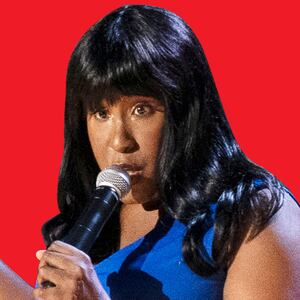In his first hour-long stand-up special Trash White, comedian Moses Storm describes himself as going “from the dumpster to HBO Max.” But as he explains in this week’s episode of The Last Laugh podcast, his real story is even darker, which makes his ability to find so much humor in it all the more remarkable.
During our conversation, Storm breaks down how comedy became his only way out of extreme poverty and why he pushes back when privileged audience members have tried to tell him it’s offensive to use the word “homeless.” He also reveals how the late Bob Saget ended up appearing in his new special, how Conan O’Brien changed his life overnight, and a lot more.
When I ask Storm how he’s feeling just a few days before his special’s big premiere on HBO Max this Thursday, Jan. 20, he readily admits that he’s “embarrassingly nervous.” He wishes he was one of those people who was too cool to care if people like his work, but instead tells me, “I care so much and want people to like this a lot and really hope that people watch it.”
Trash White is a big deal for the 31-year-old comedian, who grew up “well below the poverty line,” traveling the country in a repurposed Greyhound bus with his parents and five siblings, proselytizing on street corners about the end of the world.
They were essentially a “doomsday cult,” though he’s hesitant to use that word, because a cult is “something that’s successful, that people are duped into, but we had a lot of trouble getting people to sign up.” There were times when Storm even felt “legitimately jealous” of the media attention paid to the Westboro Baptist Church, which he only later came to understand was a full-on “hate group.”
Early in the special, Storm acknowledges that he doesn’t necessarily look like someone who grew up poor. “I look like I was conceived at an Ivy League a cappella concert,” he jokes at one point, implicitly checking his white privilege. “It’s harder for certain people that don’t look like this,” he tells me, noting that he has managed to “weasel” his way into a successful show business career despite never going to actual school or learning to read and write until his late teens.
Growing up, Storm always made his siblings laugh, but he never considered that comedy could be a career someday because, as he puts it, he had been “convinced that the world was going to end 46 minutes from now.”
“I was like, well, God’s going to wipe out the Earth, so it doesn’t matter!” he recalls. It wasn’t until he got a job at a grocery store at 16 and shared his story with a female coworker he liked that his world came crashing down. “Just seeing my story bounce off of a rational human being, it unraveled everything,” he says. “It was a deprogramming.”
“So then it was like, how do I get out of this? What am I going to do?” Storm remembers asking himself. “I can barely read or write. I have almost no social skills.” He tried to get a job at Taco Bell, but he misspelled too many words on the application and didn’t get hired. So he started performing stand-up at open mics because it was literally the “only thing” he could do to scrape by in Los Angeles on his own.
Ultimately, he decided that “monetizing” his pain for laughs was the only way he was going to avoid being on minimum wage forever and break the “generational poverty” cycle to which he had felt permanently doomed. Putting it all out there in the new special is a way of not only forgiving his parents but also moving forward to a place where he can find a way to be funny without “dumping his abuse” on the crowd.
Sharing so much of his dark reality on stage has led to some awkward moments with audience members, like the woman who came up to him after a show and told him he should stop using the word “homeless” because it’s considered derogatory.
“I’m not one of these anti-PC comedians that’s middle-aged and has a special, like, ‘Triggered Much?’” he tells me. “I hate that stuff so much. If someone’s saying, ‘Hey, this word hurts my feelings, can you just not say it then?’ Then, yeah, that’s it. You learn new words all the time.”
But when it was “someone coming from privilege” that did not share his experience “condescending” to him by saying that he should use the word “unhoused” instead of “homeless,” he was immediately put off. “When you’re on the street, you want a roof, you want security, you don’t want a jazzy new name,” he says.
Listen to the episode now and subscribe to ‘The Last Laugh’ on Apple Podcasts, Spotify, Google, Stitcher, Amazon Music, or wherever you get your podcasts and be the first to hear new episodes when they are released every Tuesday.


